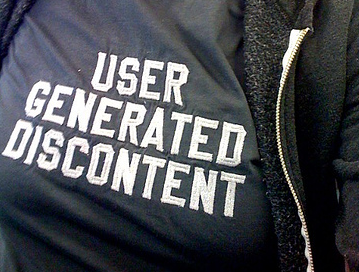Monthly Archives: August 2010
Food trends 2010+
I’m doing a talk to a food company about future trends so it’s time to revisit some food trends. This list is similar to previous lists, but somewhat expanded.
Key trends
1. Fast & convenient
2. Regional, seasonal & slow
3. Scientific solutions & functional foods
4. Comfort & nostalgia
5. Sustainable, ethical & fairtrade
6. Natural, pure & organic
7. Health & obesity
8. Indulgent
9. Portability & ready to eat
10. Premiumisation
Emergent trends
1. Food politics
2. Food inflation
Tween blogging
I’ve been reading about tweens setting up blogs and about one blog about politics set up by someone called Maelo Manning, aged eleven. I know. That’s exactly what I thought. How can anyone aged eleven be in a position to write anything meaningful about politics. However, rather than jump to a conclusion I had a look (libdemchildblogspot) and guess what? It’s not bad at all.
Some stats? I’m glad you asked. According to OfCom, 2% of kids aged 8-11 have set up their own blog and almost 20% would like to do so.
Quote of the week
Good quote from the writer Sebastian Faulks: “The more easily accessible information is, the less people feel the need to know anything. So they’ve lost the ability to think for themselves.”
Screen culture
The average Briton now spends more than seven hours per day watching TV, texting and sending emails (Ofcom report).
Home but not alone
Just spotted in the Sunday Telegraph…
In 2009, 25% of men aged between 25-29 lived with their parents. For women the figure was 13%.
Do we teach originality?
Interesting to see a comment about creativity by Cynthia Hall, Headmistress of Wycombe Abbey Girls’ School, in a piece in the Daily Telegraph yesterday (“A-levels crush creativity, says top head”).
Her point is that the Internet means that it is now all too easy to find out how to pass exams. Models answers are readily available, so students simply follow the rules to achieve top grades. However, creativity and originality may be declining as a result.
This reminds me of a conversation I had with a friend who teachers building and construction in Sydney. He said that it’s now possible for students to ask for “marking criteria” and they follow these to get top grades. However, the criteria are also used by teachers marking papers, with the result that there is now no room to mark up someone that answers a question in an original manner. These days an original answer simply gets a fail.
Information bankruptcy
Here’s an interseting idea from Delete by Viktor Mayer-Schonberger, which has echoes with something said by Google recently. Once upon a time (i.e. 20 years ago) it was possible to wipe the slate clean in terms of reputation. People forgot things, you could move from one city or country to another and start afresh. But nowadays this is virtually impossible. The internet never forgets.
So how about the idea of being able to declare information bankruptcy. Something akin to hitting a re-set button and wiping the internet clean of any information or images relating to you.
I think it was the head of Google UK who said, very recently, that people should be able to get new identities once they reached 18 or 21 to escape from the amount of information avavilable about them online (including the searches they’ve done on Google I wonder
Nice idea, in theory. Of course, you could simply be a bit more careful about what you search for, write, download or upload in the first place.
Flight to the physical?
Here are some interesting statistics. According to Peter Jones Department store in the UK, sales of white writing paper are up 102% against last year. Fountain pen sales are up 28%, ballpoint pens are up 36% and calligraphy sets are up 73%.
Now you could say that this is due to recession. People are trying to save money by writing letters rather than buying expensive greeting cards. I don’t think so. I think it’s a reaction against the sterility of email and texts. Paper is more tactile and more sensual and a handwritten notes says something than digital communication can’t.
Cost of data storage
Trying to finish off a book called Delete: The Virtue of Forgetting in the Digital Age by Viktor Mayer-Schonberger. Good but I wish it were a long essay rather than a book (ohmygawd, I’m suffering from DIG – Digital Instant Gratification).
Stat from the book (p63).
In 1957, IBM introduced the 305, a computer with magnetic disks as storage devices that offered up to 5 megabytes of space, and which was valued at around $1 million (in 2006 terms). The cost of the storage unit alone ran to about $70,000 per megabyte in the 1950s; by 1980 that price had come down to below $500 (all in 2006 dollars), less than one percent of what it had been just two-and-a-half decades earlier. Twenty years later, in 2000, storage cost had plummeted to about 1 cent, 1/50,000th of what it was in 1980. And in 2008, the cost of storage for one megabyte of information had been reduced to 1/100th of a cent.
So here’s a question. What happens to information when there is almost no cost to store it?

